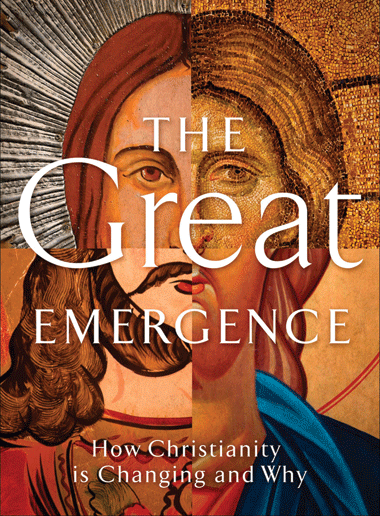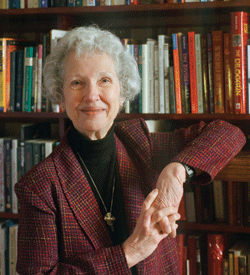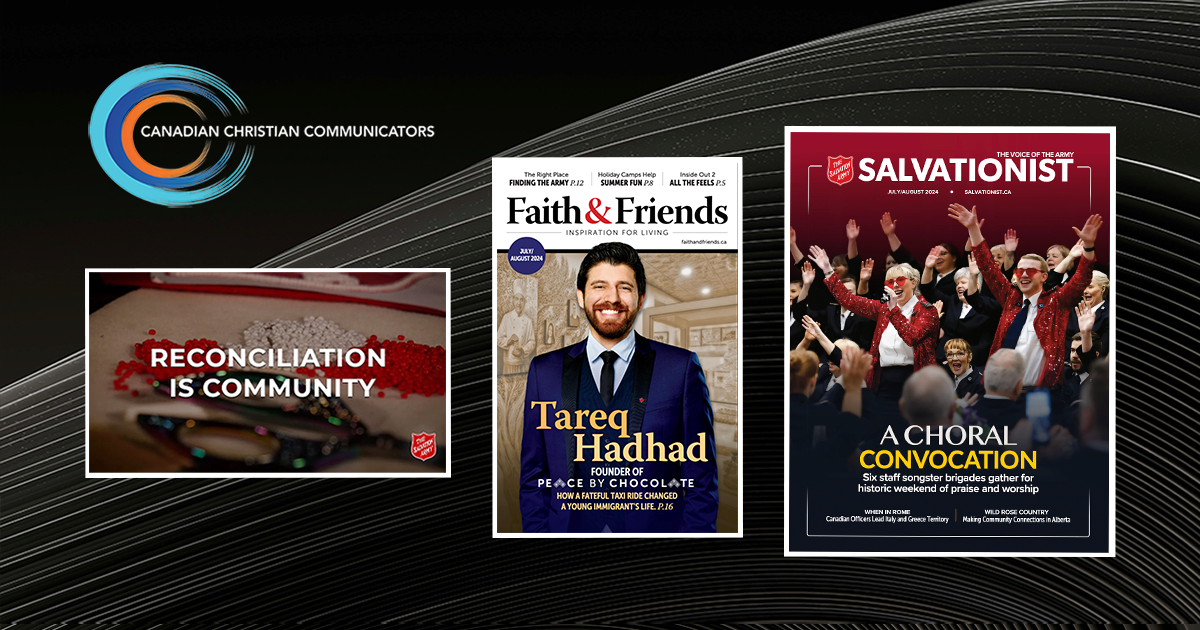 Declining church membership, the breaking down of denominational loyalty and barriers, the rise of new “emergent” churches that blend ancient rituals, litanies and hymns together with contemporary forms of worship and calls for social action—something is happening out there. But what is it? And why is it happening now?
Declining church membership, the breaking down of denominational loyalty and barriers, the rise of new “emergent” churches that blend ancient rituals, litanies and hymns together with contemporary forms of worship and calls for social action—something is happening out there. But what is it? And why is it happening now?
What's happening is as old as religion itself, says Phyllis Tickle, author of The Great Emergence: How Christianity is Changing and Why. Tickle, who will be speaking at The Great Emergence, a one-day conference in Winnipeg on October 31, explored the link between the Church's history of change and the new face of the Church today in an interview with John Longhurst, freelance writer.
What is the Great Emergence?
The Great Emergence refers to a monumental phenomenon in our world today that affects every part of our lives—religious, social, cultural, intellectual, political and economical. The world is changing rapidly, and in so many ways, that we can hardly keep up with it.
In the religious sphere, many people have observed that these kinds of changes seem to happen every 500 years—a period of upheaval followed by a period of settling down, then codification, and then upheaval again because we do not like to be codified.
For Western Christianity, the Protestant or Great Reformation happened about 500 years ago. Five hundred years before that you hit the Great Schism, when the Church divided between east and west. Five hundred years earlier you have Pope Gregory the Great, who helped bring the Church out of the Dark Ages.
During these 500-year episodes the Church has what Anglican Bishop Mark Dyer calls a giant rummage sale—it takes a look at its old stuff and decides to sell what it no longer needs. We are going through this kind of giant sale today.
What happens to the Church during this giant rummage sale?
During these times of rearrangement and upheaval, the institutionalized church throws off things that are restricting its growth. During that mighty upheaval, history shows that at least three things always happen.
First, a new, more vital form of Christianity emerges. Second, the organized expression of Christianity, which up until then had been the dominant one, is reconstituted into a more pure and less ossified expression of its former self. During the Protestant Reformation, both the reformers, and those they were reacting against, ended up being better churches.
Finally, every time the encrustations of an overly established Christianity are broken open, the faith spreads dramatically, thereby increasing the range and depth of the Church's reach. Following the Protestant Reformation, Christianity was spread over far more of the earth's territories than had ever been true in the past.
Every religion is subject to becoming encrusted and institutionalized over time. It appears to take the Abrahamic faiths—Christianity, Judaism and Islam—about 500 years before people rebel and seek reform. When that happens, new and vigorous expressions of faith emerge, breaking the moulds that have held them and scattering the pieces.
 How is this change evident in the Church today?
How is this change evident in the Church today?
Evangelicalism has lost much of its credibility and spiritual energy of late, in much the same way that mainline Protestantism has. In its place is a new approach called the emergent church. This is a new gathering of believers that is not based on traditional denominations, creeds or beliefs. It is a mix of Evangelicalism, Pentecostalism, the mainline Protestant churches and the liturgical tradition, together with an emphasis on head and heart—not just one or the other—along with the deep commitment to social justice.
This new style of Western Christianity is not hierarchical or based on a certain doctrinal system. It's more about community and conversation, not about a set of beliefs and creeds. It is incarnational, not creedal. It is not interested in structures, hierarchies and buildings.
Does this mean the death of traditional mainline denominations?
No! Just as the Protestant Reformation didn't spell the end of the Roman Catholic Church—it emerged stronger and more vibrant—mainline denominations won't disappear. They are losing their dominant position, but they can use this experience to reform themselves and become more relevant in the world.
How is this current upheaval different from what the Church has experienced before?
For the first time we are doing it in an age of instant media. The Internet makes it easy to talk to each other across national and denominational boundaries in a way that wasn't possible before. But the Internet isn't causing this change; it is enabling it, just as the printing press assisted the growth and development of the Protestant Reformation.
E-mail, the web and social media are allowing people to become connected in new ways. They allow this new form of church to be a self-organizing system—it is not dependent on central offices and structures. It's a leveler, it's egalitarian.
What are people looking for during this Great Emergence?
People are looking for a new and different encounter with God. The strength of Protestantism was its rationalism—it took religion to the head. But today people want religion that also touches their hearts. It's not anti-intellectual; mind and reason are still very important. But people want more than just an intellectual challenge. They want something that moves them emotionally, as well. It is bringing the heart and the head together.
One characteristic of this emergent view of the Church is a return to, and recovery of, liturgy and connectedness to church history. Many Western Christians have acted like the first 1,500 years of the Church never happened—they start in the 1500s with Martin Luther and go from there. But there is a rich tradition of church fathers and mothers who lived faithfully and thoughtfully between those two events. The emergent church is going back to that time and finding deep meaning as they use those old prayers and litanies in worship, along with things like the Book of Common Prayer.
How might Christians respond to these changes?
We need to respond prayerfully and carefully. This change isn't happening all at once—it will occur over many years. Like previous social, political, economic and religious upheavals, how we should respond is not always clear on a day-to-day basis. It was the same during the Protestant Reformation, a time filled with reformers, protestors, puritans, pietists and others. We have to remember that it's not as if Protestantism came forth in one perfect or cohesive package; they didn't always know where things were going, or the consequences of their decisions and actions. Yet it all came together to create this new construct we have called Protestantism, the very thing that is under challenge today.
How do you feel about the changes you are seeing today?
I am optimistic about the future of the Church. For me, Christianity has never been more alive and vigorous than it is right here and right now. The Kingdom of God is coming in many forms and many places these days. All I can say is: “Thanks be to God!”
Tickle's appearance in Winnipeg is being organized by FaithForum, an organization dedicated to helping Canadian churches strengthen their worship, mission and service, with the support of a number of Christian churches and institutions, including The Salvation Army's Prairie Division, Booth College and College for Officer Training. For more information and to register, go to www.faithforum.ca.
Photo credit: Pete Ceren









Comment
On Saturday, March 20, 2010, Anne de guzman said:
On Sunday, September 27, 2009, Lee Westman said:
On Monday, September 14, 2009, Rick said:
I also talk about God and Jesus to people about me. I invite them to come to Jesus with me. When they do we hang out together to laugh, sing, pray, learn, and commit. Eventually these folk want to meet other Christians and so I invite them to come with me to where I go. Sometimes they enter right in, sometimes they don't feel it's their kind of culture so they seek other places where they can laugh, sing, pray, learn, and commit. The emerging church is all about people doing what Jesus called us to do. The rest is culture.
On Sunday, September 13, 2009, Rob J. said:
On Thursday, September 10, 2009, Dawn Green said:
Why you ask, because when salvation is not preached,then that is a problem in itself. I have been a soldier of the Salvation Army for 15yrs and the changes have been quite evident The hymms in the church are hardly sung and the bible by many aren't brought. Altar calls are not done like it use to,is there a belief that everyone is saved, I don't think so,if they are then great.I was told that it is all about numbers and money. William Booth was all about winning souls.Lets not water down the gospel.Keep the blood of Jesus.Don't be afraid to speak the truth. As they say the truth will set you free. Do we want souls to be won for the kingdom of God or the father of darkness. Don't change so much that you don't know what you are fighting for, isn't lost souls.
On Sunday, September 6, 2009, Herman Guenther said:
Leave a Comment